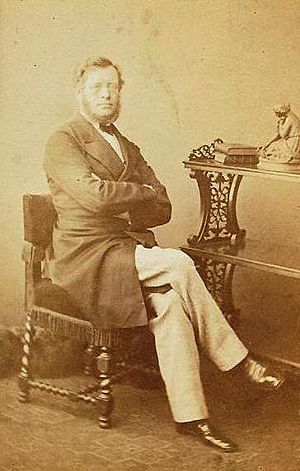Joseph Cubitt facts for kids
Quick facts for kids
Joseph Cubitt
|
|
|---|---|

Joseph Cubitt photographed in the 1860s
|
|
| Born | 24 November 1811 Horning, Norfolk, England
|
| Died | 7 December 1872 (aged 61) St George Hanover Square, London, England
|
| Nationality | English |
| Parent(s) | Sir William Cubitt Abigail Sparkhall Cubitt |
| Engineering career | |
| Discipline | Civil engineering |
| Projects | |
Joseph Cubitt (born November 24, 1811 – died December 7, 1872) was an important English civil engineer. Civil engineers design and build big structures like bridges, roads, and railways. Joseph Cubitt helped create many famous projects, including the Blackfriars Railway Bridge over the River Thames in London.
Joseph Cubitt: A Master Builder
Joseph Cubitt was born in a place called Horning, in Norfolk, England. His father, Sir William Cubitt, was also a very famous engineer. Joseph learned a lot about engineering from his dad.
He went to school at Bruce Castle School in Tottenham. This education, combined with his father's teaching, prepared him to become a skilled civil engineer.
Building Railways and Bridges
Joseph Cubitt worked on many big projects that helped connect different parts of Britain. He helped build large sections of several important railway lines. These included the London and South-Western Railway and the entire Great Northern Railway. He also worked on the London, Chatham, and Dover Railway, the Rhymney Railway, and others.
Besides railways, Cubitt designed other important structures. He was responsible for the Weymouth Pier, which is a long walkway built out over the water. He also worked on improving the harbor at Great Yarmouth. One of his most famous designs was the new Blackfriars Bridge in London. This bridge allowed trains to cross the River Thames.
Joseph Cubitt was also a respected member of the engineering community. He was a vice-president of the Institution of Civil Engineers for many years. This group helps engineers share knowledge and improve their skills.
His Later Years
Joseph Cubitt passed away on December 7, 1872, in St George Hanover Square, London. His work left a lasting mark on Britain's infrastructure, especially its railway system and bridges.
See also
 | Tommie Smith |
 | Simone Manuel |
 | Shani Davis |
 | Simone Biles |
 | Alice Coachman |

